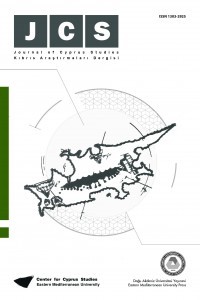Rekabet Edebilirliği Artırmak için Uygun Vergi Politikaları: Mikro Ekonomi Örneği
Vergi, verimlilik, rekabet edebilirlik
Proper Taxation Policy for Enhanced Competitiveness: The Case of a Micro Economy
Taxation, productivity, competitiveness,
___
- Arnold, J. (2008). Do Tax Structures Affect Aggregate Economic Growth? Empirical Evidence From a Panel of OECD Countries’, Economics Department Working Paper No. 643, ECO/WKP (2008) 51, OECD.
- Besim, M. and G. P. Jenkins (2005). Tax Compliance: when do employees behave like the self-employed?’ Applied Economic, Vol. 37, No: 10 June pp.1201-1208.
- Besim, M. (2000). The Size of Unrecorded Economy in the Turkish Republic of Northern Cyprus: A Monetary Approach. Muhasebe Finansman Dergisi, Marmara University, Vol. 13, Issue 9.
- Duanjie, C. and Jack, M. (2010). Canada’s Tax Competitiveness after a Decade of Reforms. SPP Briefing Papers, School of Public Policy, University of Calgary, Vol. 3 Issue 5.
- Eurostat (2010). Taxation Trends in the European Union. European Commission.
- Goerke, L. (2006). Corporate and Personal Income Tax Declarations. CESifo Working Paper, No. 1781.
- Gutmann, P. M. (1977). Subterranean Economy. Financial Analyst Journal, (November/December), pp. 26-34.
- Jenkins, P. Glenn (2001). Diagnostic and Proposals for the Reform of the Personal Income Tax System in the TRNC. Review of Social, Economic & Business Studies, Vol.1, No.1, pp. 64-95.
- Johansson, A., Heady C., Arnold J., Brys B., and Vartia L. (2008). Tax and Economic Growth.
- Economics Department Working Paper, No. 620, ECO/WKP(2008)28.
- Mayor’s Task Force on Tax policy & Competitiveness in Philadelphia (2009). Thinking Beyond Today: a Path to Prosperity, USA.
- Mintz, J.M. (2006). Tax Competitiveness Report: Proposals for Pro-Growth Tax Reform. C.D. Howe Institute Commentary, No. 239.
- Mintz, J.M. (2007). Tax Competitiveness Report: A Call For Comprehensive Tax Reform. C.D. Howe Institute Commentary, No. 254.
- Myles, G. (2009) Economic Growth and the Role of Taxation - Disaggregate Data. Economics Department Working Paper, No. 715, ECO/ WKP(2009)56, OECD.
- North Cyprus Tax Office (2010). Personal Income Tax Brackets for 2009, Nicosia, North Cyprus. OECD (1997). Economic/Fiscal Instruments: Competitiveness Issues Related to Carbon/Energy Taxa-tion’, Annex I, Expert Group on the United Nations Framework Convention on Climate Change, Working Paper, No. 14, OCDE/GD (97)190.
- Official Gazette, no: 784, December 2010.
- State Planning Organization (2012). Economics and Social Indicators. Nicosia, North Cyprus.
- Talpos, I. and Vancu, I. (2009) Corporate Income Taxation Effects on Investment Decisions in the European Union’, Anales Universitatis Apulsensis Series Oeconomica, 11(1).
- Tanzi, V. and Zee, H. (2000). Tax Policy for Emerging Markets - Developing Countries. IMF Working Papers 00/35, International Monetary Fund.
- Tobin, J. (1969) A General Equilibrium Approach to Monetary Theory. Journal of Money Credit and Banking, 1, 15-29.
- Turkish Republic of Northern Cyprus Central Bank (2010). Quarterly Bulletins, Vol.1, Nicosia, North Cyprus, 2010.
- Turkish Cypriot Chamber of Commerce, 2009, 2010, 2011,2012,2013 Competitiveness Reports, Nicosia, North Cyprus.
- Turkish Cypriot Chamber of Commerce (2009). Özel Sektörün Rekabet Gücünü Olumsuz Etkileyen Kamu Kaynaklı Yükler. Nicosia, North Cyprus.
- Vartia, L. (2008) How Do Taxes Affect Investment and Productivity? An Industry Level Analysis of OECD Countries. Economics Department Working Paper, No. 656, ECO/WKP(2008)64), OECD.
- The World Bank (2006). Sustainability and Sources of Economic Growth in the Northern Part of Cyprus’ Volume I: Economic Assessment, Volume II: Technical Papers. Poverty Reduction and Economic Management Unit, Europe and Central Asia Region.
- ISSN: 1303-2925
- Başlangıç: 2019
- Yayıncı: Doğu Akdeniz Üniversitesi
Geleneksel Kıbrıs Kırsal Zeytinyağı Değirmenlerinin İncelenme ve Belgelenmesi
Kıbrıs’ta 1963 Olayları’nın Türkiye Büyük Millet Meclisi’ndeki Yansımları
Rekabet Edebilirliği Artırmak için Uygun Vergi Politikaları: Mikro Ekonomi Örneği
Fatih BAYRAKTAR, Lenka DEDKOVA, Hana MACHACKOVA
